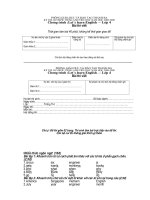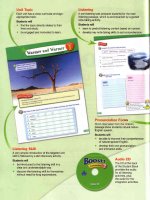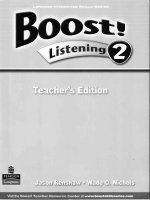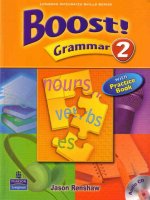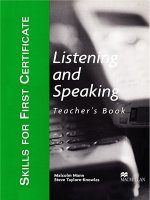boost listening 2 tb
Bạn đang xem bản rút gọn của tài liệu. Xem và tải ngay bản đầy đủ của tài liệu tại đây (11.18 MB, 97 trang )
iftsnin
-
i:!1,
l.
,
,,.,1,
p!:
',
'
I
,
-
*
t;:::
-:': ::: :-'t
,-;.3:.:I
'!-i:
i:'t, -
-,
-' -1, , ,;
r'
;:;:j:l:3
!,.
-::
l,., :
;
l],;
Published
by
Pearson Longman Asia
ELT
20lF Cornwall House
Taikoo Place
979 King's Road
QuarryBay
Hong Kong
fax +852 28569578
email:
\^nvw.p earsonlongman. com
and
Associated Companies throughout
the world.
@ Pearson
EducationAsia Limited
2008
All rights reserved;
no
part
of
this
publication
may be reproduced,
stored in a
retrieval system,
or transmitted
in any form
or by any
means, electronic,
mechanical,
photocopying,
recording, or otherwise
without the
prior
written
permission
of
the
Publishers.
First
published
2008
Reprinted 2008
(twice)
Produced by Pearson
Education Asia Limited,
Hong Kong
CTPS/03
ISBN 978-962
-0r-937
6-7
Publisher: Simon Campbell
Senior Editor:
Howard Cheung
Project Editor:
Jessica
Balde
Editor:
IeffZroback
Designers:
Iunko
Funaki, Tonic
Ng
Illustrators: Balic Choy,
Bernd Wong
Audio Production: David
Pope and Sky
Productions
For
permission
to use copyrighted
images, we
would like to thank @ Laureen
Morgane/zefalCorbis
(pp.
4 L
and
9), Chris Stowers
@ Dorling
Kindersley
(pp
5 TR and I2), @
Ariel Skelley/Corbis
(p.
15), Yellow Dog Productions/Getty
Images
(p.
23), Andy Crawford
@ Dorling
Kindersley
(p.
26), Benelux/zefalCorbis
(p.
29), @
Mika/zefalCorbis
(p.
32),
Philip Dowell @
Dorling Kindersley
(p
35), @ LarryWilliams/zefalCorbis
(p.
37),
Dorling Kindersley @ Rowan Greenwood
(p.
40), @
Lori Adamski Peek/Getty
Images
(p.
a3), @
Patrickward/Corbis
(p.
44 R),
Linda\Vhitwam
@ Dorling Kindersley
(p
48), Demetrio Carrasco @
Rough Guides
(p
51
L), @ Catherine
Karnow/Corbis
(pp.
5I R and 52
R), @ GrantV
Faint/Getty
Images
(p.
52
L),
@ Stephane
Cardinale/People
Avenue/Corbis
(p.
5a), @
Iohn
Eder/Getty
Images
(p
57),
@ Nancy
KaszermanlZUMA/Corbis
(p.
62 L), @
FrankTrapper/Corbis
(p.
62
R),
@
RichardT. Nowitz/Corbis
(p.
71), @ Carl
&Ann Purcell/Corbis
(p.72
R), @ Kevin Schafer/Corbis
(p.76),ODreamPictures/Gettylmages(p.79),@AndrewHolbrooke/Corbis(p 80),@ColorBlind/Gettylmages(p.82),@AndrewHobbs/Getty
Images
(p.
B5), Tony Souter @
Dorling Kindersley
(p
88), @Yang Liu/Corbis
(p.
91).
Acknowledgements
Boostl Listening is dedicated
to a
great
family:
mywifeYeona and son
Jamie,
my
parents Bruce and Diane, sisters
Naomi and Kara, uncles Colin,
Buck and
Derek, and aunts
Alison, Marion and
Christine.
I'd also like to express
a special
dedication
to my
grandparents Bruce and Sylvia
Renshaw
who inspired
me from birth
with the desire to dream
and excel.
Here are the
listening books for
you
all-just
to
prove
I did listen
.
Iason
Renshaw
The Publishers
would also like to
thank the following
teachers for
their suggestions
and comments
on this course:
Tara Cameron,
Rosanne Cerello,
Nancy Chan, Chang
Li Ping,
foy
Chao,
Jessie
Chen,
fosephine
Chen,
ChiangYing-hsueh,
Claire Cho, Cindy
Chuang,
Linda Chuang, Chueh Shiu-wen,
Mark de Boer,
Mieko Hayashida,
Diana
Ho, Lulu Hsu,
Eunice
Jung,
Hye Ri Kim,
Iake
Kimball,
Iosie
Lai, Carol
Lee, Elaine Lee,
Melody Lee,
Peggy Li,
Esther Lim, Moon
Jeong
Lim,
Iasmin
Lin, Martin
Lin,
Catherine
Littlehale Oki, Linda
Liu, Tammy
Liu, Goldie
Luk, Ma Li-ling,
Chizuko
Matsushita,
Geordie
McGarty, Yasuyo
Mito, Eunice
Izumi Miyashita,
Mari Nakamura,
Yannick O'Neill,
Coco
Pan, Hannah
Park,
Karen
Peng, Zanne Schultz,
Kaj
Schwermer,
MiYeon Shin, Giant Shu,
Dean Stafford,
Hyunju Suh,
TanYung-hui,
Devon
Thagard,
John
and Charlie
van Goch,
Annie Wang, Wang Shu-ling,
Wu Lien-chun, Sabrina
Wu, Yeh
Shihfen,
Tom Yeh, Laura Yoshida and
Yunji Yun.
The
publisher's
policy
is to use
paper
manufactured
from
sustainable
lorests
I
I
p.B
Science
and
Nature
Lecture
on
global
warming
&l
\i
Sports
and
Leisure
fx
r,
'"
iWffi
Review
ry
TL;'d;,r: ila'r
rlahrrfinn<
i
Culture
and
People
Radio
program
discussing
birthday
traditions
and
history
K"
llllzrrlzchaat
Dialogue
about
planning
a
festival
-ff
I
l__-
Worksheet
2
U]
Lecture
on
the
Grand
Canyon
q
&{
,8
Geography
and
Nature
r: ]i:.:r:tr:r:1,
:
.i l.r,.l
,rl: ,:
il.'r
r'
, rr:1.
i
rr:rr
'i :
lltlnrlzcheot
p.41
|ll
Sports
and
Leisure
Dialogue
about
a
student's
vacation
p.47
lAtnrksheet
W
Review
p,48
Theme: Movies
Culture and
People
Lecture
on
Hollywood
and
Bollywood
Worksheet
p.
55
Culture and
People
Phone conversation
about movie tickets
,pi ,56i,l
Worksheet
p.61
Review
4
p.62
l,:
ffii
History and
Geography
Lecture on Atlantis
Worksheet
p.69
at:ta:t:al
:t:r:rtrr:iil
lt
fr
\
,,.,.i',1
History
and
People
.!.dtint!fu !.h'$ leuiA:r
l
,a:nd,.lgffett,.,'.',.'.,
'l' ' .'':,.1'
;'.'
Presentation on
Stonehenge
11p1,,,70;,.
T
Worksheet
p.
75
Review 5
p.76
Theme: News
and Current Affairs
fj
Worksheet
Class report
on online news
p.
83
Culture
and
People
,,l.,:De{id.]ngi.!f.'e',',,
l:,,,r'r,,,
',,.Sp.ea.kei
:,i.i, iU,ie,,,ot:
',,,t1h5,U:iel,',,,''
:,:,',.,,
.,.,,,,,.,,,
Dialogue about news
stories
p.89
Worksheet
Review
5
p.
90
CD Script
p.92
Finding
the main ideas
(11
Listening for repeated
key words
can help
you
find the main idea
of a
listening
passage.
While
listening
and taking notes,
you
can add stans or manks next
to the wonds
you
hean more than
once.
Howeven, mark
only the nepeated
content words such as key nouns, venbs, adjectives
and
adverbs,
but notfunction words
like articles
la,
an, thel,conjunctions
land,
or because,4etc.j
and
prepositions
lof
in, at, etc.]. You will
need to learn
to
pay
less
attention to these than to repeated
content words.
You should also
pay
attention to
diffenent
wond
forms such as /ose, /ost, losrng
and high, highea
height, heighten.
To
pnepane
students fon this unit, write
weather, warm and warmer
on the boand.
Have
students
listen
to Tnack 2 from
Unit 1 and raise
their hands each time thev hean the words
or
fonms
of the
wotds
fAnswens:
weathen
x 3, wanm x 1,
wanmer x 3J.
A
Globol worming
is cousing
seo
Ievels
to become higher
ond
higher. This
could result in
people
who live
on
islonds
losing
their homes. There clre mony
islonds in the oceons
thot don't
hove mountoins,
so seo Ievels
don't need to
get
much higher
before these islands
ore lost. This mqkes
globol
worming o very
big
problem
for countries
thot ore mode up mostly
of
low
islonds, such os Fiji
ond the Solomon
Islonds.
1. globol
worming
(twice)
4. islonds
(five
times)
2.
seo
levels
(twice)
5.
losing/lost
(twice)
3. higher
(three
times)
Globol worming is
moking seq levels higher,
so
people
who live on islqnds could lose their homes.
1.
Become higher.
3. Islonds thot do not hove mountoins.
2. People who
live on islonds.
4.
Countries
mode
up
mostly
of
low islonds.
@
o
A
1. If
temperotures
continue to rise, mony onimol
species could become extinct.
2. Would
higher
seo
levels meon
some countries will
become smoller?
3. Glociers
oround the
world
ore
melting
becouse of the wormer climote.
4.
Reducing
greenhouse
goses
will help
us to slow down
globol
worming.
1. temperotures,
rise, onimol
species, extinct
2. higher,
seo
levels,
some, countries,
smoller
3.
glociers,
melting, wormer, climote
4. reducing,
greenhouse goses,
slow down,
globol
worming
ffi
Co-plete the sentences
using the
words.
Globalwarming
is
chonging the
world in mony woys.
,
Glaciers
ore big sheets of ice
on
lond.
Aytarctica,
, ,, is
the continent covered in
ice
ot the South Pole.
Penguins
and seols hove odopted
to cold
leype*fq-ttyl-e? .
.A'
@},o0
Listen to the lecture
and
take
notes.
W€ffi'
Key
words:
qlolaly,Lryi1g,
wgyld'
-'-"
q-la9i9r7,.ic*q,mellli1g,wea-t'h|?r:w-4lme'r
2
3
glociers globolworming
temperotures Antorctico
;
6b@
CD script on
p.
e2.
Key
words
:
-glg?
ut
y
u@\q
:
A!!?:9ri93:_
_i9e
!jcy,.w.a-lg9\*!
e-ypq.aty:.e
(s),
_
t illfp
enly?t?,
yi!49
1
1_yy9
off !,i|!l9d
Take
notes effectively by
abbreviating words or using symbols.
For a list of common note-taking
shortcuts,
go
to
pages
7
0
-7
2.
Closs:
Dote:
Download the audio forthis worksheet
at
(^
www,boostskr'lfsse
ries,com
tH
@
Listen
to the class report
and write
the
key words. Then listen
again
and
check
[/]
the boxes
each time
you
hear
the words.
1
2
3
4
5
global
warminq
tr
E
D
D
D
D
tr
tr
tr
tr
D
tr
D
tr
D
tr
D
tr
D
tr
D
tr
tr
!
D
O
Write
the
main
idea
of the report,
using the repeated key words.
Listen
again
to the class report
and write
the answers.
1
Whot is
globol
worming
cousing seo levels
to do?
2
Who might lose
their homes
becouse of
globol
worming?
3 Whot
kind
of
islonds
would
be the first to
be
lost?
4 Whot
ore Fiji
ond the Solomon Islonds
exomples
of?
@,
Listen
to the
statements and write
the key words.
1
2
3
4
Photocopiable
@ Pearson
Education Asia Limited
2008
Boost!
Listening 2
Listening for
details:Who, when, where, why and how
Listening
fon details can be veny
challenging. You can
put
the details
you
listen for into five
categonies:
details about the
people
being descr^ibed
[whoJ,
details about
the
places
being
described
[where],
details about the times being described
fwhenJ,
details about the neasons for^
doing
something
[why]
and details about
the
ways
to do something
[how].
When listening
fon details,
you
can start
youn
note-taking
by
wniting
the
question
words who,
when, where,
whyand how on a
piece
of
paper.
Then
as
you
listen,
you
can take
notes nextto
the
question
words as
you
hear
specific details that answen these
questions.
Q
Cit o, Hold on o minute,
Dod. Didn't
we
wolk by those two trees obout on hour ogo?
Dqd: Hm
yeoh,
I think we did. You know whot
I
think
we're lost!
Gino:
Oh, nol We've come so for into the forest. The
pork
rongers won't
be
oble to find us!
Dcd: Don't
ponic,
Gino.
I know
just
how to
get
out. When I wos
young, your
grondpo
tought me thot if
I wos
ever lost, I should
just
wolk
downhill.
As long
os
you're
going
downhill,
sooner
or
loter
you'll
find
o
villoge
or town
where you
con osk
people
for help.
Gino: Thot mokes sense.
But
which woy
is down? It's hord to tell when there ore trees everywhere.
Dod: Well, there's
o streom over there. Hove
you
ever seen woter flow uphill?
Who:
dod,
pork
rongers,
Gino,
grondpo, people
in towns
Where:
two trees,
forest, villoge,
town, streom
When:
on hour
ogo,
when
dod
wos young
Why: for in
the forest
(why
pork
rongers will not find them), will find
villoge/town
(why
wolk downhill),
trees everywhere
(why
it is hord
to tell
which woy is
down)
How:
wolk downhill
(how
to find villoge/town
to
get
help),
see
which woy the streom is flowing
(how
to
tell
which wov is
down)
1.
2.
3.
Ginq ond her dod.
In
the
forest.
When he was young.
4. Becouse there ore
trees everywhere.
5. By seeing which woy the streom
flows.
A
1. I think we're lost! 4.
Sooner or
Iater
you'll
find o villoge or town.
2.
We've
come so for into the forest.
5.
It's hord
to tell
when there ore trees everywhere.
3.
The
pork
rongers
won't
be oble to find us! 6. Well, there's o streom over there.
1. we're
=
we Ore
2. we've
=
we
hove
3.
won't
=
will
not
A
.+.
6.
you'll
=
you will
it's
=
it is
there's
=
there
is
The
Great Outdoors
l{cwv
eam
yow
stay
safe
wkenx
camplmg?
S6scrxss
your
-
"t
L*sten
tCI the dialogwe amd afrrele the eorreet detail{s}.
Informotion
,:,
rr
:r.:r.:, :] , ,]:il
,lili:tr :l:ii:tli:
i t ::,,.,:,:t,::,t,:.,;:,,.
r.:),t,,:. ,1:;,,':
,
',,.
:
1
1
People
(who)
2 Ploce
(where)
3 Reoson
(why)
4 Time
(when)
5 Woys
to do things
(how)
".
IiII :
@
,',,,,Ditoil$
Jenny
beoch
@
5:00
knife
€i#
forest
ITCES
@
string
{1l-gii:
mountoin
rlver
1:00
Fretesrd
yoi,i
are cannping
wlth
yor,xr
friemds"
Wdrite three
things
you
need to do
at the campsite.
l:ll:i:t:i::l:il:il::t::ti]li:,]:,t]:.:ti:tili:il,:li:lill:t]:rilrl::l:ril:
f
compfire
We
needto
start
a
gampfire.
L:":
2
We
needto se;;tupthe
tent.
ffiftpr0@
Listen to the diatogue amd
talqe
x'rotes.
1rY66'
park
ranger
When :
put
out'
fire before
go
t'o sleeT,
leave b ags at
p
ark
gate when
leaving
Where:
put
t
ent
next to t'ree,
leave
bage
at
payk
gate
Why: ?ut,tgn!:next
totreebecausenot?o
windy /
putoutfire-couldstarttirein
",u1,
r',liik
,r:ilk
',:ri!*!
tr:1!.
i:s&
:t::l&
.:,r't:11,
@ft,,'@
CD suipt
on
p.
92.
CD snipt on
p.
92-93.
!-istem
to tlre voice
mlessage and take
nstes on
a
separate
pieee
of
paper.
Then eonnplete the
table.
1
2
3
Who else
is coming?
Where ore
they meeting?
How ore
they
getting
to
the storting
point?
Why ore they
toking the short
troil?
When should they be
bock by?
Kim,David and
Julie.
lnfront ofthe
school.
bytakingthebus.
It, is easier and
more relaxing.
5:OO.
.,ii]lil]:l!]il.:.i:.]1]]1.lii]ii]11i|:
Write
an
emai!
invlting a friend to
join
the
hike. Include
irnportant
details
from
your
notes.
Read
your
email to
the class.
Nome:
Download
the audio for this worksheet
at
w w w,
b o os tskr-lfss e r i e
s, c o
m
to)
Closs:
Dote:
@t
Listen
to the dialogue
and complete
the table with
the details
you
hear.
Who
Where
When
why
How
llUP
Listen
again
to the dialogue
and
write
the answers.
1
2
3
Who
qre
lost?
Where
ore
they
lost?
When
did
Gino's dod leorn whot
to do if he wos ever lost?
Why is it
hord to see which woy
is downhill?
How
con they tell which woy is
downhill?
@
Listen
to the statements
and write
the contracted
words.
1
2
3
4
5
6
Photocopiable
rO
Pearson
Education Asia
Limited 2008
Boost! Listening 2
Llsten
to the
lecture and
take notes
on a
separate
piece
paper.
Then
write the
answer.
Whot
key
words does the speoker
repeot
in the
lecture?
sases,gl79-91!9!L?999e :e?-:-grg!p!-=.sd)'lyyelu,b1u;yn(i19) *-
.ffiL
&#
Circle the
main
idea of the
lecture.
a
Humons
ore burning
forests
for formlond.
b Scientists
ore moking
greenhouse
goses.
O
Humons
ore creoting
o lot of
greenhouse
goses'
d Cool
is importont
for moking electricity.
,t%.
\;
g@l
q#FO@
Listen to the staternents
and
write the
key words"
scientie,2rlqlic_gd,worldlg,lempe_y4lure,hgtter
_gre_e-n-h9_ys_e_g??.ep!po::we!5@!9tt?:!-?_cJ_9!j9?__ "
et-!g,c_r_,-g\o_b_{y1gya\qe_r.rongg_lLsto!E?-__
scienaistg,
w arn, anim
alp.
4iglpp
e-Af
_.
1
2
3
4
!-isten to the
phone
conversation and take notes on a separate
piece
of
paper.
Then write the
answers.
Where
ore the
girls going?
Tothemountains.
When is
the trip?
Nextweekend.
How ore
they
getting
there?
5 Who else is
going?
Anna andMay.
bybue.
we're
Where'e
Why does Paulo not need to toke
o tent?
because t hey are staying in
a cabin.
Listen to the statements and write the contracted words.
Then write their full forrn.
1
2
3
4
_
we are
-
Whereis
I'll
shouldn't,
- lwill
-
should
Birthdry
Parties
Finding
the
main
ideas
[2)
Sometimes
speakens
intnoduce
thein
main
idea
in the
fonm
of
a
question. Usually,
the speaker
is
not
peally
expecting
an answen
to the
question, but
lust
wants
to make
listenens
think
about
what
thein
answer.
would
be.
These
questions
can
introduce
the
main
idea
of
a listening
passage,
and
may
begin
with
phnasesllke What
about
"'
and
What
if .'.
.
To
pr-epar
e
students
to
listen
fon
main
ideas
that
come
in the
fonm
of
questions,
you can
have
them
br-ainstorm
a list
of common
question words
(who,
what,
when,
where,
why,
hotU
etc].
Have
students
listen
to
Tnack
16 fnom
Unit
3 and
wnite down
the
question
wond
they
hean
[Answer:what].
Q
Vorrng
people love to
hove
big
porties for their
birt
Derson
in the
world
hove?
Well, Iet's
tqke o
look ot
birthdoys.
Cruz
is believed
to
hove
been the
oldest
she
hod o
very Iorge
fomily,
she
preferred to celebl
just
her children,
grondchildren,
greot-grondchild
mode
o huge
porty of oround
180
people!
@
Mqin
ideo:
What
kind of
birthdoy
porties the oldest
person in
the
world
hod
Supporting
details:
Cruz
Hernondez
is believed
to
hove been
the
oldest
person in history'
She
preferred
to celebrote
her birthdoys
with only
her
closest
fomily
members.
She
hod
huge
porties.
O
1.
young
people, Cruz
Hernondez,
children,
grondchildren,
greot-grondchildren
ond
greot-
greot-
grondchildren.
2. Her closest
fomily
members.
3.
728.
L. but
2. olthough
3.
however
Birthdry
Parties
Fimdimg
che rnaln ieieas
{P}
A speaker"
can
pnesent
the main ideas
by asking a
question.
Often this
question
tells
you
the
topic and introduces
some of the othen infonmation
you
are
going
to hean
rySWYYYTTry:Iry"
F{ow
dfrd
yorx
cclebrate
yoexr
*ast
bFrthday? S8sec*ss
y&&er
&mswers.
,&.
ffb&'m
Listen
tc thse radfrCI
presram
amd completc tke
questFCIm.
Whot
ore some of tlTe
P-?rty
qamee
played
in North America
ffi
*r,t" the
answers.
Whot
do
people
do on their
birthdoy in
your country?
?eq?lg in my cou1!ly_\4yg
4p4rty
o1thellyb*irvlhd?y.
2
Whot foods do
people
eat
on their birthdoy
in
your
country?
?_egtJ-"
j!yv-99_y!!!!_e-V;r\rtndgycau,gon!'heif
?Y_t!4e-y
euestion
(s)
t
H,9;1w
Y 9-u*"t!AeY.
celebrat
ions differenl'
around lhe
world?
Detoils
:
_ug
-
c)t"itl!9!get
b:l!::l!2y
_-_
cake:Rrgs_pie 9!j!4f p1n_s_e_!\fiV!4yp1e,
watv
-fyig!!?
:
f
u-A
!!! :!!4'.
:l:_
for eachyear
alive
ffi*
Listen to the
radio
program
and take
notes.
euestion
(s)'
*w.\9-ry
alil
\fy! 4 lv-
W*!99:9ll9
!:gy?rl!jy
i, d
thzl__
_
beqin?
Detoils :
ujy.tt
4ey_ra*_v_
b gq-el
Fy:ppe _-"
\lylttp,4eyear_sago,badepir1p 1pr1y.Ig;!*q/
.u1_s1_t_"ro"lpjrthdaylscare7?if!!g=_-_ ".
-f
ri
en ds
l t a mlly
lr
yp_ p
e*, -!
_gZu
g_
_Wg?gnvpLry?le*glgry_olgftWy.hetped
keep epirite away
Or@
CD suipt
on
p.
93.
-re
rotes
to
guide
you"
Then
listen
again
to the
t5wer5.
1
Whot is
the moin
ideo
of Soroh Wison's
report?
ltj.efp
Vjf_t!{1y
p_?llt_qs come frgyl
?n-4
w:\y
_
theybegan.
Whot
is
the moin ideo
of Peter
Lee's
report?
How
birt hday
celebrations
are different
aroundtheworld.
A speoker
moy
stress some
words
to show
o controst
between
two
ideos.
These
words
include
but, although,
however,
while,
whereas.
Listen.
Listen
to the statements
and number
the ideas
in
the ordCi"thii
y6'li
hear
therm. Then
write
the word
that shows
the contrast.
eot coke,,3-;
.i.
, ri
'
.:'
In
the
Unit€d,
Stotes:
ehildren,,g,et,firthdoy:coke,
but in Russio
mony
children get
birthdoy
pie.
1
2
3
4
eot noodles
i3,i
light
during porty
l
1
.r
light
condles in
morning
2
celebrote on
some day
2
celebrote
on dote of birth
1
get
money
1
get
presents
2
but
while
however
although
Don't
confuse
the main ideas
with details.
Details
are
smaller bits
of information
that
supoort the main
ideas.
tw
@
1@
3@
,r#
$ai&
My
birthdoy's coming
soon ond I want
to
hove o
porty.
It'd
be
great
if I
could
invite
my whole class
ond moke it o very
big
porty.
At
the
porty,
I'd like
to hove chocolote
coke
ond
ploy
cord
gomes.
Then I wont
to
go
to
the omusement porkl
!-isten to the
passage
amd take netes
on a separate
piece
of
paper.
Then write tlne
answer"
{i
.o.ptete the table.
Whot question
does the speoker
osk?
What about,Ahose
people
whol1ik9 small
parties?
G[r@
cD script on
p.93.
I
gmall
j
;
1
I
I
l
l
family andverybest friende
I
I
I
''t
I
icecreamcake
I
i
-i
I
play
board
games,
go
to video
arcade
!
lrr:ri:r:!
lillirrr:li
fl:il:::.i:
l l l a i: l l l a l i: l l: i: l r: l
':
l : l :.:
i a
y
verybig
atiitati:u:r,:l
r:t,:t.:t'::i:t::
:,,1
whole
class
chocolate cake
play card
gamee,
go
t o
amusement
park
r'G&.
ffi
Compare the
two
parties
with a
elassnrate.
Nome:
Closs:
Dote:
Download
the
audio for this
worksheet
at
(
www,boostskr'lfsse
ries,com
tH;
t@t
listen
to
the lecture
and write
the
answers.
Mqin
ideq:
Supporting
detoils:
Listen
again
to the lecture
and write
the
answers.
1
Who
were
mentioned
in
the report?
2
Who
did Cruz Hernondez
like
to celebrote
her
birthdovs with?
3 How
old
wos
Cruz Hernondez
when
she died?
@
Listen
again
to the lecture
and write
the word
that
shows
the contrast.
Ideq
1
ldea 2
Word
thqt
shows
the controst
young people's
birthdoy
porties
oldest
person's
birthdoy
porties
1
very
lorge
fomily
closest
fomily members
2
closest
fomily
members
huge
porty
3
Photocopiable
@ Pearson
Education
Asia
Limited 2008
Boost! Listening
2
Making
inferences
(1):Who
and
what
Often
speakers
will
not directly
state
who
is doing
on will
do
what.
In
this
case,
you
must
make
infenences
based
on
what
is stated.
This
requires
making
smart
guesses. For
example'
if one
speaker
says
he/she
needs
help
with a
science
pnoyect,
and
anothen
speaken
mentions
that
a
certain
student
is
good
at
science,
an
inference
could
be
made
that
the
finst
speaken
might seek
that
student's
help
with
his/hen
pnoject.
To
prepare students
for. this
unit,
have
them
listen
to
Tnack
22 from
Unit
4 and
write
down
the
names
of the
speakers
[Michelle
and
Ted].
Then
have
them
listen
again
and
take
notes on
what
each
speaker
is
good
at
[Answers:
Michelle-computers,
Ted-cooking].
A
Iu_!
Alqn:
Hi, Cindy.
How ore
the
plons for the
festival?
It,s
going
pretty well octuolly.
I think
I've
found
people to do
most
of the tosks
on
this
list.
Reolly,
Iike
who?
Well, there's
Mondy,
the
exchonge
student.
She
hos o
lot of
good ideos
for
fun
porty
gomes. And
did
you
know
thot
Mr.
Lee
hos o
huge collection
of
music
from oround
the
world?
Alon:
Sounds
good.
But
whot about
this
tosk
on
your list?
who's
doing
thot?
Cindy:
Er thot's
still
o
problem.
Any suggestions?
Alqn:
Oh,
it,s
got
to
be
Ken's
mom!
Remember
she
mode
those
Iittle
round
things
for the
class
picnic?
Cindy:
Oh,
yeoh-those
cheese
bolls!
Right,
I'll
coll
Ken tonight'
Alqn:
Well,
looks
like
you've
got most things
covered
now.
Hey,
I could
do
this
onel
You know
I con
point
PrettY
well
Cindy:
Oh,
thot'd
be
such
o big
help.
Thanks,
Alonl
Cindy:
Alqn:
Cindy:
Mondy:
Mr.
Lee:
Ken's
mom:
Alon:
1.
Mr.
Lee
1.c
2.
Alan
2.b
exchonge
student
I
alot
of
good ideos
for
porty
gomes
huge
collection
of
music
from oround
world
mode
cheese
bolls
for closs
Picnic
con
point
well
3.
Mondy
4.
Ken's
mom
o
o
O
1.
nisht
2.
who
3.
knows
4. well
